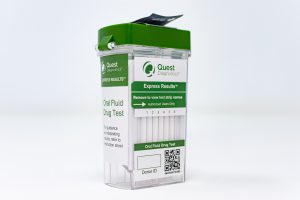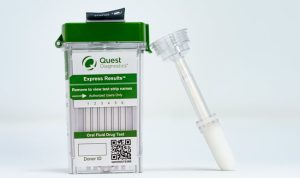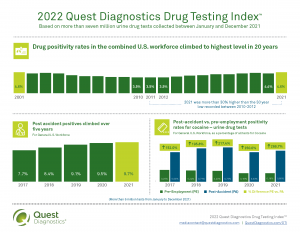There may be 50 states, but there are literally hundreds of statutes, regulations, laboratory licensing requirements, and case law decisions that have a direct impact on workplace drug testing. Not every state has a drug testing law, but virtually every state has workers’ and unemployment compensation regulations that include drug testing language. And many states have case law on the books that plays a role in when and how workplace drug testing is conducted. What every employer should know about drug testing laws differs, but we cannot understate the importance of being fully aware of how state laws impact your drug-free workplace program.
Quest Diagnostics Employer Solutions is dedicated to helping customers maintain drug testing programs that comply with applicable state and federal laws. Simply put, employers cannot afford to compromise. When it comes to employee health and safety, Quest Diagnostics provides peace of mind and confidence throughout the life of a drug test specimen.
While Quest Diagnostics is not a law firm that dispenses legal advice, our laboratories are licensed and certified to conduct drug testing for employers, our patient service centers include workers who have been trained and are qualified to collect specimens, and our customer service representatives can answer many questions and, when necessary, direct customers to our valued partners who specialize in policy development, supervisor training, and answering state law and federal regulatory questions.
Substance abuse continues to affect the workplace. According to the 2023 Quest Diagnostics Drug Testing IndexTM (DTI), an annual report based on the results of more than 10.6 million drug tests conducted at Quest laboratories, in 2022, the combined US workforce urine drug positivity for all drugs persisted at 4.6%—the highest level in two decades. The 2021 and 2022 positivity rates were the highest since 2001, up more than 30% from an all-time low in 2010-2012.[1]
Workers’ Compensation Law
A potential side effect of more workers testing positive for drugs, could mean more drug-impaired workers on the job. Invariably this could compromise workplace safety and result in more accidents. The results of post-accident drug positivity is well documented in the results of the Drug Testing Index.
According to the DTI, over the last 5 years, in the general US workforce, overall urine drug testing post-accident positivity increased 22.6% (8.4% in 2018 versus 10.3% in 2022). Specifically, post-accident positivity (as compared to pre-employment tests) in urine specimens tested for marijuana and cocaine in the general US workforce was higher by 58.7% and 230%, respectively.[1]
Additionally, post-accident urine positivity for marijuana among the federally mandated safety-sensitive population increased year over year by 16.7% (1.8% in 2021 versus 2.1% in 2022) and over five years by 40% (1.5% in 2018 versus 2.1% in 2022). Pre-employment positivity for marijuana also increased 18.2% for this group (1.1% in 2021 versus 1.3% in 2022) and 30% over five years (1.0% in 2018 versus 1.3% in 2022).[1]
Post-accident positivity rates and workers’ compensation law are often correlated. Each state has some type of workers’ compensation regulation, and many reference an employer’s right to move to deny or reduce payable benefits if an injured worker was intoxicated or otherwise under the influence of drugs at the time of an accident. In some states, the workers’ comp law includes specific drug testing requirements.
Unemployment compensation law
Most states have an unemployment compensation law. Much like workers’ compensation benefits, some states have specific drug and alcohol testing conditions included in the unemployment compensation law for employers to successfully challenge a claim.
Missouri for example, is a state without a mandatory or voluntary drug testing law and includes extensive drug testing requirements as part of its unemployment compensation law. These requirements include use of a laboratory certified by the US Dept. of Health & Human Services and compliance with certain aspects of the US Department of Transportation drug and alcohol testing procedures like collection procedures and chain of custody protocols.
Another example showing the complexity of drug testing in different states is Mississippi, a state with a voluntary drug testing law. Here an employer must drug test in accordance with the procedural requirements in the state’s voluntary law to successfully challenge an unemployment compensation claim.
State government regulations
In addition to specific laws at the state level, there may also be state government regulations that directly impact drug testing. This is often the case as various local government agencies have jurisdiction over specific aspects of drug testing such as a state department of health overseeing laboratory licensing.
Sometimes the regulations impose requirements on the laboratory and other times they impose requirements directly on employers who use laboratories for drug testing purposes. Because there are many state agencies that could have authority over some aspect of drug testing, it is wise to become familiar with all such requirements to ensure compliance.
Privacy laws
Often a state will have a privacy law or a provision within its state constitution that guarantees privacy, which can impact an employers’ drug-free workplace program. If so, these requirements should be included as part of a company’s policy to ensure the integrity of the program and protect the dignity of each participating employee and job applicant.
Some state legal marijuana laws include privacy-type language that can directly affect workplace drug testing. In many of these states the law prohibits employers from discriminating against a job applicant or employee if the company becomes aware that the individual is a registered medical marijuana user.
The complexities of marijuana continue to challenge employers. We asked an industry expert for her take and what employers should consider.
Case law
Is it ever enough to simply research a state’s drug testing statute or regulation? No. To ensure complete compliance with all legal requirements, a review of applicable case law is needed. All states have some related case law decisions that serve to clarify a statute or regulation or, in states without mandatory drug testing laws, to establish legal guidelines or requirements.
California is a good example of a state without a drug testing statute like the ones you would find in Iowa or Kansas, but with several precedent-setting case law decisions that serve to shape the legal landscape for drug testing in the Golden State. In New Jersey, the Hennessey v Coastal Eagle Point Oil decision from 1992, while supporting random testing of certain workers, also put forth specific policy components that employers would be wise to incorporate into their programs.
Conclusion
Being and staying compliant with state law is critical to running a reputable drug-free workplace program. Employees deserve to be treated fairly and adopting a one-size-fits-all approach to considering the drug testing solution.
Because of the nuance and potential pitfalls employers may face when implementing and enforcing their policies, Quest Diagnostics experts can help. Our helpful resources, including our people, can add invaluable insight when you are considering the drug test solution that best fits with your workplace needs.
To learn more about drug testing, visit our website or contact us online.
[1] “Post-Accident Workforce Drug Positivity for Marijuana Reached 25-Year High in 2022, Quest Diagnostics Drug Testing Index Analysis Finds.” Quest Diagnostics. May 18,2023. https://newsroom.questdiagnostics.com/2023-05-18-Post-Accident-Workforce-Drug-Positivity-for-Marijuana-Reached-25-Year-High-in-2022,-Quest-Diagnostics-Drug-Testing-Index-Analysis-Finds
 Your Privacy Choices
|
Privacy Notices
|
Terms
|
Language Assistance / Non-Discrimination Notice | Asistencia de Idiomas / Aviso de no Discriminación | 語言協助 / 不䈚視通知
Your Privacy Choices
|
Privacy Notices
|
Terms
|
Language Assistance / Non-Discrimination Notice | Asistencia de Idiomas / Aviso de no Discriminación | 語言協助 / 不䈚視通知



















There may be 50 states, but there are literally hundreds of statutes, regulations, laboratory licensing requirements, and case law decisions that have a direct impact on workplace drug testing. Not every state has a drug testing law, but virtually every state has workers’ and unemployment compensation regulations that include drug testing language. And many states have case law on the books that plays a role in when and how workplace drug testing is conducted. What every employer should know about drug testing laws differs, but we cannot understate the importance of being fully aware of how state laws impact your drug-free workplace program.
Quest Diagnostics Employer Solutions is dedicated to helping customers maintain drug testing programs that comply with applicable state and federal laws. Simply put, employers cannot afford to compromise. When it comes to employee health and safety, Quest Diagnostics provides peace of mind and confidence throughout the life of a drug test specimen.
While Quest Diagnostics is not a law firm that dispenses legal advice, our laboratories are licensed and certified to conduct drug testing for employers, our patient service centers include workers who have been trained and are qualified to collect specimens, and our customer service representatives can answer many questions and, when necessary, direct customers to our valued partners who specialize in policy development, supervisor training, and answering state law and federal regulatory questions.
Substance abuse continues to affect the workplace. According to the 2023 Quest Diagnostics Drug Testing IndexTM (DTI), an annual report based on the results of more than 10.6 million drug tests conducted at Quest laboratories, in 2022, the combined US workforce urine drug positivity for all drugs persisted at 4.6%—the highest level in two decades. The 2021 and 2022 positivity rates were the highest since 2001, up more than 30% from an all-time low in 2010-2012.[1]
Workers’ Compensation Law
A potential side effect of more workers testing positive for drugs, could mean more drug-impaired workers on the job. Invariably this could compromise workplace safety and result in more accidents. The results of post-accident drug positivity is well documented in the results of the Drug Testing Index.
According to the DTI, over the last 5 years, in the general US workforce, overall urine drug testing post-accident positivity increased 22.6% (8.4% in 2018 versus 10.3% in 2022). Specifically, post-accident positivity (as compared to pre-employment tests) in urine specimens tested for marijuana and cocaine in the general US workforce was higher by 58.7% and 230%, respectively.[1]
Additionally, post-accident urine positivity for marijuana among the federally mandated safety-sensitive population increased year over year by 16.7% (1.8% in 2021 versus 2.1% in 2022) and over five years by 40% (1.5% in 2018 versus 2.1% in 2022). Pre-employment positivity for marijuana also increased 18.2% for this group (1.1% in 2021 versus 1.3% in 2022) and 30% over five years (1.0% in 2018 versus 1.3% in 2022).[1]
Post-accident positivity rates and workers’ compensation law are often correlated. Each state has some type of workers’ compensation regulation, and many reference an employer’s right to move to deny or reduce payable benefits if an injured worker was intoxicated or otherwise under the influence of drugs at the time of an accident. In some states, the workers’ comp law includes specific drug testing requirements.
Unemployment compensation law
Most states have an unemployment compensation law. Much like workers’ compensation benefits, some states have specific drug and alcohol testing conditions included in the unemployment compensation law for employers to successfully challenge a claim.
Missouri for example, is a state without a mandatory or voluntary drug testing law and includes extensive drug testing requirements as part of its unemployment compensation law. These requirements include use of a laboratory certified by the US Dept. of Health & Human Services and compliance with certain aspects of the US Department of Transportation drug and alcohol testing procedures like collection procedures and chain of custody protocols.
Another example showing the complexity of drug testing in different states is Mississippi, a state with a voluntary drug testing law. Here an employer must drug test in accordance with the procedural requirements in the state’s voluntary law to successfully challenge an unemployment compensation claim.
State government regulations
In addition to specific laws at the state level, there may also be state government regulations that directly impact drug testing. This is often the case as various local government agencies have jurisdiction over specific aspects of drug testing such as a state department of health overseeing laboratory licensing.
Sometimes the regulations impose requirements on the laboratory and other times they impose requirements directly on employers who use laboratories for drug testing purposes. Because there are many state agencies that could have authority over some aspect of drug testing, it is wise to become familiar with all such requirements to ensure compliance.
Privacy laws
Often a state will have a privacy law or a provision within its state constitution that guarantees privacy, which can impact an employers’ drug-free workplace program. If so, these requirements should be included as part of a company’s policy to ensure the integrity of the program and protect the dignity of each participating employee and job applicant.
Some state legal marijuana laws include privacy-type language that can directly affect workplace drug testing. In many of these states the law prohibits employers from discriminating against a job applicant or employee if the company becomes aware that the individual is a registered medical marijuana user.
The complexities of marijuana continue to challenge employers. We asked an industry expert for her take and what employers should consider.
Case law
Is it ever enough to simply research a state’s drug testing statute or regulation? No. To ensure complete compliance with all legal requirements, a review of applicable case law is needed. All states have some related case law decisions that serve to clarify a statute or regulation or, in states without mandatory drug testing laws, to establish legal guidelines or requirements.
California is a good example of a state without a drug testing statute like the ones you would find in Iowa or Kansas, but with several precedent-setting case law decisions that serve to shape the legal landscape for drug testing in the Golden State. In New Jersey, the Hennessey v Coastal Eagle Point Oil decision from 1992, while supporting random testing of certain workers, also put forth specific policy components that employers would be wise to incorporate into their programs.
Conclusion
Being and staying compliant with state law is critical to running a reputable drug-free workplace program. Employees deserve to be treated fairly and adopting a one-size-fits-all approach to considering the drug testing solution.
Because of the nuance and potential pitfalls employers may face when implementing and enforcing their policies, Quest Diagnostics experts can help. Our helpful resources, including our people, can add invaluable insight when you are considering the drug test solution that best fits with your workplace needs.
To learn more about drug testing, visit our website or contact us online.
[1] “Post-Accident Workforce Drug Positivity for Marijuana Reached 25-Year High in 2022, Quest Diagnostics Drug Testing Index Analysis Finds.” Quest Diagnostics. May 18,2023. https://newsroom.questdiagnostics.com/2023-05-18-Post-Accident-Workforce-Drug-Positivity-for-Marijuana-Reached-25-Year-High-in-2022,-Quest-Diagnostics-Drug-Testing-Index-Analysis-Finds